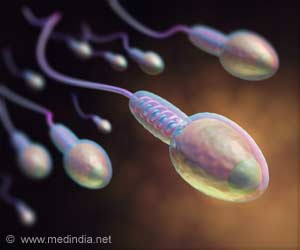Semen quality is very poor in young men in Switzerland. A nationwide study found that only 38 percent of young Swiss men had semen quality parameters above the threshold set by the WHO for fertile men.
- Semen quality is very low in young men in Switzerland
- This was revealed by a nationwide study led by the University of Geneva
- Only 38 percent of young Swiss men had semen quality above the threshold set by the WHO for fertile men
The study was led by Professor Serge Nef, Ph.D, who is Director of the Department of Genetic Medicine and Development, Faculty of Medicine, University of Geneva, Switzerland.
One of Nef’s most important collaborators and a co-author of the paper was Dr. Alfred Senn, who is an Andrologist at the Assisted Medical Procreation Center (CPMA) in Lausanne, Switzerland.
This long-term study involved a 15-year long collaboration between many researchers from various organizations. Besides the University of Geneva, other institutes included the National Institute for Cancer Epidemiology and Registration (NICER), the Swiss Center for Applied Human Toxicology (SCAHT), the FABER Foundation, the HUG Foundation, and the Swiss National Science Foundation, as well as many Andrology Centers across Switzerland.
Read More..
Study Background
Some facts about infertility are highlighted below that provide the background of the study:- Infertility is the inability to conceive even after one year of regular sexual intercourse
- The number of infertile Swiss couples using assisted reproductive technology (ART) between 2002 and 2010, increased from 3,000 to 6,000 annually
- Infertility can be caused by reproductive problems in men as well as women
- The exact cause of infertility cannot be determined in 10-15 percent of cases
- In men, the semen quality is the major factor that determines fertility
- Major factors that can influence a couple’s fertility include the following:
- Stress
- Smoking
- Alcohol abuse
- Environmental factors
- Epidemiological studies from Western countries have reported a drop in sperm count from 99 million per milliliter (ml) to 47 million/ml
- Sperm concentration in European men ranges between 41-67 million/ml
- Sperm concentration in Swiss men is only 47 million/ml, which is the lowest of all European countries, including the bottom three – Denmark, Norway, and Germany
Salient Features of the Study
- This is the first nationwide study on semen quality in young men in Switzerland
- Study participants included 2,523 Swiss men aged between 18 and 22 years
- The participants came from all 26 cantons in Switzerland
- All participants were conceived and born in Switzerland
- A questionnaire regarding education, health, lifestyle, and diet was filled by all participants
- Parents of the participants also filled a questionnaire regarding the course of pregnancy, besides health, lifestyle, and diet
- Questionnaires were designed to assess the gestation conditions that could have influenced the reproductive health of the participants
- The following parameters were analyzed:
- Semen volume
- Sperm concentration (number of sperms/ml)
- Sperm motility
- Sperm morphology
Study Findings
- 38 percent of Swiss men had semen quality above the threshold established in 2010 by the World Health Organization (WHO) for fertile men
- 17 percent of men had sperm concentrations below 15 million/ml
- 25 percent of men had less than 40 percent of motile sperms
- 60 percent of men had at least one of the three parameters (sperm concentration, sperm motility, and sperm morphology) below the threshold set by WHO
- 5 percent of men had problems with all three parameters simultaneously
- No difference in semen quality was detected in the different geographical regions and linguistic areas in Switzerland, which could account for differences in lifestyle
- No differences in semen quality were detected between urban and rural areas
- Semen quality and fertility was reduced in men exposed to maternal smoking during embryonic development
Does Semen Quality Influence Testicular Cancer?
Scientists tried to identify whether there was a correlation between poor semen quality and increased incidence of testicular cancer in Swiss men. This stems from the fact that the incidence of testicular cancer has increased in Switzerland over the past 35 years and currently, stands at 10 cases per 100,000 men, which is much higher than in other European countries. Moreover, scientific evidence suggests that semen quality is lower in countries with a higher incidence of testicular cancer, which results from altered testicular development during the embryonic stage.Concluding Remarks
Senn concludes: “With the current trend for couples to have children later in life, the low sperm count among young men in Switzerland – combined with the declining fertility of older women – will have an impact on conception rates and future generations. This will lead to significant social and financial challenges for our society.”Reference:
- Semen quality of young men in Switzerland: a nationwide cross‐sectional population‐based study - (http://dx.doi.org/10.1111/andr.12645)
Source-Medindia










